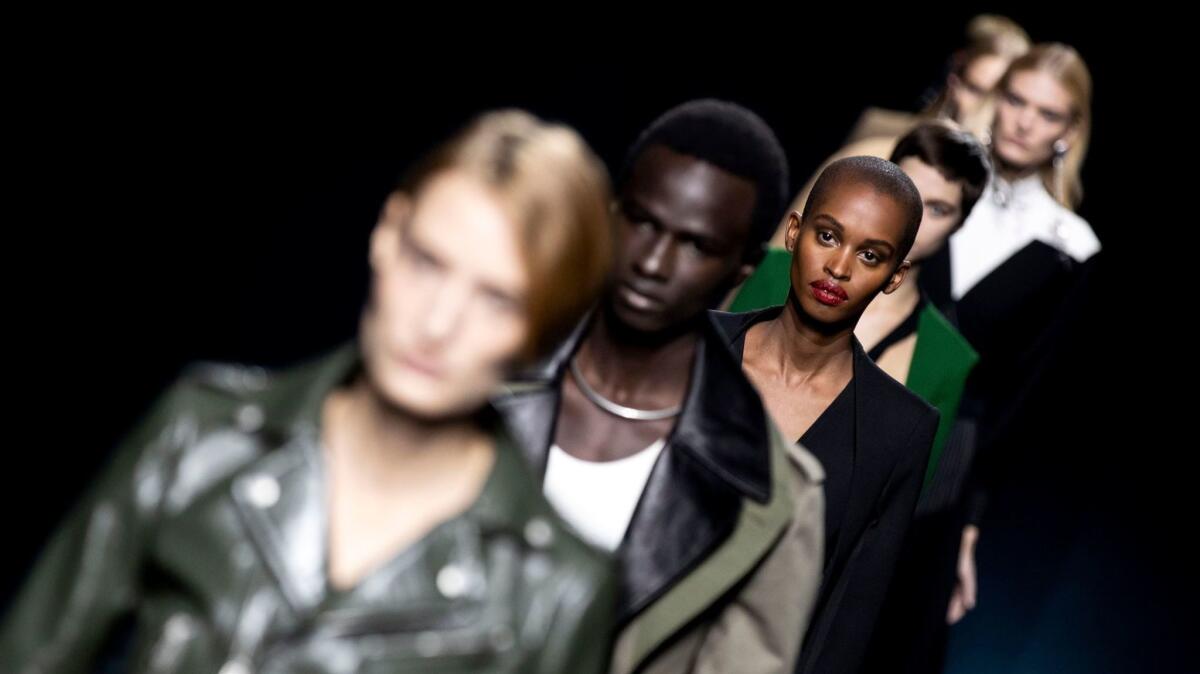Paris Fashion Week: For spring and summer 2019, Givenchy makes the case for gender-fluid power-dressing

- Share via
Reporting from Paris — Guests arriving at the Givenchy show at the Palais de Justice on Sunday night were treated to a fun bit of stagecraft involving a laser beam. Originating deep inside the venue where the collection would be presented, the beam traveled hundreds of yards down a dark hallway and around several corners — thanks to several strategically placed mirrors — before refracting through a lens near the entrance to display the name Givenchy in a tall, shimmery typeface over the stairs leading into the building.
As attendees would shortly discover, the idea of mirroring — as in bending and shaping of reflection images — played as key a role in the collection as it had in the signage.
In her show notes, artistic director Clare Waight Keller explained that the collection had been inspired by an “abstract idea of mirrors” that allowed males and females to “cross-pollinate their gender characteristics … [resulting in] a nonchalant approach to gender codes, reflective of an evolved global mentality.”
She cited as a specific reference Annemarie Schwarzenbach, a 20th-century Swiss writer “who identified as female but boldly dressed in menswear amid the collapse of the exuberant Weimar Republic in the 1930s,” as well as Lou Reed and Nico (a.k.a. Christa Päffgen), circa the late ’60s. Backstage after the show, the designer said she’d discovered Schwarzenbach while researching dress silhouettes.
“She came out of the ’30s,” Waight Keller told the scrum of reporters, “and she was this spectacular-looking woman who just had this very unusual upbringing in that her mother never told her she had to be a boy or a girl and so she really played — throughout her whole life — with this idea of being super-masculine or hyper-feminine and just really doing it in a way that was quite modest. That’s why I had those tights underneath the dresses and with sandals, and layered jackets on top as a sort of layered masculinity.”
Waight Keller said that while she’d touched on the interplay between masculine and feminine at various points in her design career, she sees it as particularly relevant — and powerful — today. “I think it’s appealing actually, and I think it’s a very freeing thing for women and their wardrobes,” she said. She added that designing for today’s woman wasn’t about creating armor for the outside but finding a way to instill strength from the inside.

“There’s a sense of power in being who you want to be at any [particular] time in your life without having to be resistant to the way you look or dress,” she said, “[and] to being able to play into that masculinity and still be hyper-feminine at the same time [without] losing any of your spirit or identity as a woman.”
The beige-heavy color palette (a riff on the non-gender-specific uniformity of military dress) keyed into the week’s big color story, joined here by warm shades of deep yellows, dark greens, lavender, salmon and indigo blue. Silhouette-wise, the collection was heavy on high-waisted, generously cut trousers that contrasted against a smaller shoulder on dresses, tops and jackets (the shoulder shape was all the more noticeable at Givenchy because it runs completely counter to the huge, sharp shoulders that have been dominating the collections here).
The collection was shot through with silver-laminated resin, metallic thread and silver-lacquered lace, all intended to reference the notion of reflection, as well as various permutations of faded floral prints that appeared on both the men’s and men’s offerings. (When Waight Keller joined the label she decided to present both the men’s and women’s collections together — a decision that, given the instant collection, seems genius.)
It’s notable that Givenchy isn’t the only luxury label at Paris Fashion Week to explore the notion of a less gender-stratified wardrobe for spring and summer 2019. At Maison Margiela, John Galliano framed his non-gender-specific “Co-ed” collection as an attempt to “break free from binary stigmatization,” while the show notes to Hermès’ sailor-meets-saddler collection asked pointedly, “Why choose between them?”
Only time — and cash-register receipts — will tell if the efforts to break with the binary we’ve seen this fashion week will gather steam or flame out, but Waight Keller’s observation that there’s power in being able to be one’s self — super-masculine or hyper-feminine or floating freely between the two — is a lesson the fashion world would do well to heed.
For more musings on all things fashion and style, follow me at @ARTschorn







